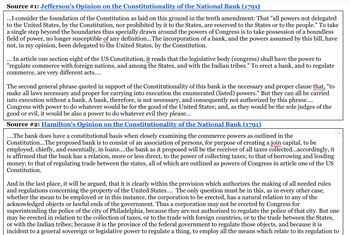- Close Reading: How do the reasons outlined in source #1 compare with Jefferson’s lyrics in Cabinet Battle #1? Does the song seem to accurately represent Jefferson’s reasons for opposing the bank? Cite evidence from both source #1 and the song to support your claim.

The government of any country or state is meant to execute those principles and policies that are citizen-friendly and welfare orientated. The legislative organ of the government that formulates laws has to take the consent of the masses into cognizance otherwise it often turns the masses against it if a violation of rights is felt accordingly.
The question touches on and includes two different opinions one pro erection of National bank and the other somehow against the policies of Bank establishment.Jefferson perceives every step as a violation that is not inculcated within the powers of administration; whereas Hamilton believes the requirement of the institutions can be interpreted from the provisions of the constitution itself. The opposition of Jefferson can be gauged from one of the excerpts of his song which is as under:
Oh, if the shoe fits, wear it
If New York's in debt, why should Virginia bear it?
Uh, our debts are paid, I'm afraid
Don't tax the South 'cause we got it made in the shade
In Virginia, we plant seeds in the ground
We create, you just wanna move our money around
This financial plan is an outrageous demand
And it's too many damn pages for any man to understand
Stand with me in the land of the free and pray to God we never see Hamilton's candidacy
Look, when Britain taxed our tea, we got frisky
Imagine what gon' happen when you try to tax our whisky
Step by stepSolved in 2 steps
